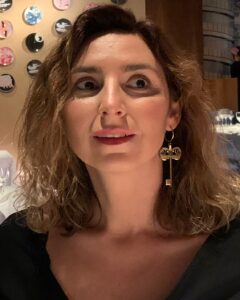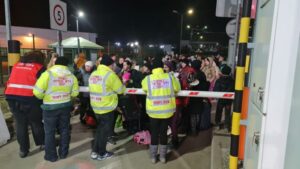People across Poland take action in solidarity: “Driving supplies to the border to help refugees”
Everyone I know here in Poland is trying to do something to help the Ukrainian population. From the first day of invasion, NGOs, citizens and companies acted to help. On Facebook a support group for refugees was created and its members quickly grew to five hundred thousand. Everything is offered, from a bed to a job, means of transport, commodities, useful information and so on, everything for free.
 While cities populate with new inhabitants, marketing strategies changed on the fly. At this point almost every website, from the bank to mobile network, has a section dedicated to Ukrainian refugees, help and services of all kinds.
While cities populate with new inhabitants, marketing strategies changed on the fly. At this point almost every website, from the bank to mobile network, has a section dedicated to Ukrainian refugees, help and services of all kinds.
The Jewish Community of Warsaw immediately took an official stance against Putin’s invasion and the American Jewish Joint Distribution Committee offered meals to the exiles. It is estimated that Poland has already seen one million refugees from Ukraine crossing its territory in recent days.
Those who can, host people feeling the war, and by looking at their everyday things, almost identical to ours, we really understand how close the war is to us and how their condition could become ours one day. Doing skincare with a mother who fled with her child from Kiev, leaving everything she had behind, becomes a moment of sharing, of short serenity and levity. The stories of nights spent in bunkers or sleeping in a car shock us.
I couldn’t stay at home twiddling my thumbs, reading all those horror news online, I decided to offer one of my key skills to society: driving. My car was filled with 2500 sandwiches prepared by the volunteers of “Zupa na granicę”. It’s a cooperative that has been active since last summer with the humanitarian crisis on the border with Belarus. As its name suggests, “Soups for the border” gets ready and sends food to refugees coming from the border.
 On the twelfth day of the Ukrainian invasion I left Warsaw at dawn towards one of the furthest crossing places, Medyka, around 400km from the capital. In the outskirts of Przemyśl another group of volunteers were waiting for me, they were from the organisation “Społeczny Komitet w Przemyślu – Pomoc dla Ukrainy”. They unloaded my car and sorted all the sandwiches to the first reception centres, close to the border and the Przemyśl train station. In the latter alone, 10,000 sandwiches are distributed per day.
On the twelfth day of the Ukrainian invasion I left Warsaw at dawn towards one of the furthest crossing places, Medyka, around 400km from the capital. In the outskirts of Przemyśl another group of volunteers were waiting for me, they were from the organisation “Społeczny Komitet w Przemyślu – Pomoc dla Ukrainy”. They unloaded my car and sorted all the sandwiches to the first reception centres, close to the border and the Przemyśl train station. In the latter alone, 10,000 sandwiches are distributed per day.
The volunteers of this local committee are exhausted, they haven’t slept for days and are trying to provide a shelter, a meal and hygiene products for the first nights on Polish soil. Not only do they take care of refugees, but they also have been running an educational centre for teenagers with disabilities for years. The volunteers, exemplary organised and followed, offer me a hot dish and tea.
Przemyśl, being already a small treasure of the Austro-Hungarian Empire and an important Jewish centre, thanks to the beautiful buildings in eclectic style and art nouveau, is slowly trying to revive after decades of neglect. Eastern Poland has always been neglected.
The currently ruling national-conservative party started from here, it willingly got votes, fomenting the frustration and the complex of inferiority of the people with the help of the Catholic Church. Already past Lublin, continuing southeast, the atmosphere changed, it was no longer the bustling Poland full of pubs and shopping centres, but that of small villages overflown by helicopters and crossed by military convoys.
No one returns to Warsaw with an empty car and I head towards the crossing to offer a place to stay and a ride in the car to some Ukrainian families. The road from Przemyśl to Medyka, about 10 km long, offers already a bleak landscape, without trees, with the dismal road due to road works and garbage in the ditches. Once arrived in the place I find myself in front of a small circle of Dante’s hell. A chaotic mass of tents from NGOs, including Israel’s Hatzala Lelo Gevulot, bonfires where anything is burned, journalists with cameras, mountains of used clothes and exhausted and terrified people, under one of those thick snows that don’t take root.
It is a particularly painful moment, when you have to choose only four people among the crowd of women with children and pets. A police officer helps me by screaming aloud my destination and the number of seats in the car. I follow him and with a lump in my throat I only manage to say “Children, children”. Two women come towards me, two friends with their two little children, happy that their nightmare journey is over, more or less. I bring them to the car and show them my driver licence. Maybe they would feel safer sending a picture of the driver’s ID to their families.
They are exhausted from a two-day journey without even a break to sleep, they flee with small bags in their hands, they have left behind husbands, sons, brothers and fathers, greeting them as if it was the last time. We don’t understand each other that much, but we agree on one thing: describing the invader as sadistic and fascist. They tell me about their surrounded city, Kryvyi Rih (where the president Volodymyr Zelensky was born). They tell me how they can no longer stay in the house because of the roar of fighter aircrafts that fly so low that they make the walls shake.
Under a continuous din of sirens from the many ambulances, fire fighters, and columns of police cars accompanying politicians and various bureaucrats towards east, we managed to arrive in the city in the evening, where they were picked up by a family member from western Poland.
With my own eyes, I could see what had already been guessed. Most of the work is being done by the council administration, the citizens and the small organisations, in short by the civil society, that part of community so mistreated in recent years by this government that on the skin of all of us now tries to get a better reputation in Europe.
*Art historian and former curator of the Umberto Nahon Museum of Italian Jewish Art in Jerusalem
From top, the reception of refugees at the Polish-Ukrainian border by volunteers of the Israeli NGO Hatzala Lelo Gevulot; the author Anastazja Buttitta; the station of Przemyśl where volunteers of the Jewish organisation HIAS work.
Translated by Alice Pugliese and revised by Gianluca Pace, students at the Advanced School for Interpreters and Translators of the University of Trieste, interns at the newspaper office of the Union of the Italian Jewish Communities – Pagine Ebraiche.

